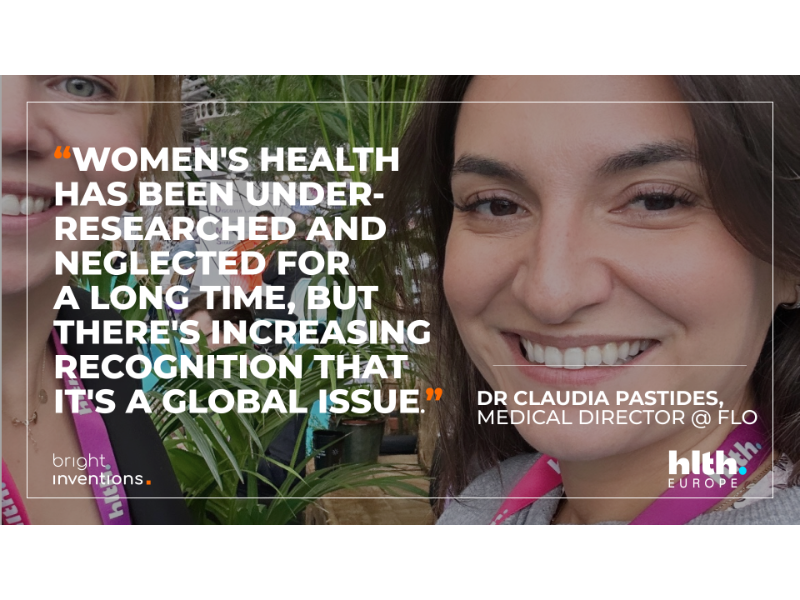- Flo Health’s groundbreaking $200 million funding inform a significant transformation in the femtech industry, reflecting both growing investor confidence and the sector’s expanding influence.
- Despite its remarkable growth, femtech faces persistent challenges such as underfunding and market volatility, highlighting the need for sustained support and innovation.
OUR TAKE
Flo Health’s recent achievement of unicorn status in Europe, alongside its substantial funding round, underscores a pivotal moment in the femtech industry. This development reflects a broader recognition of the sector’s potential to transform women’s health and empower women within technology. Despite facing challenges like funding disparities and market fluctuations, the industry’s progress is indicative of its growing significance and future promise.
— Zoey Zhu, BTW reporter
In recent years, the femtech industry has witnessed remarkable growth, with companies like Flo Health leading the charge. Flo Health, a prominent app focused on menstrual health and wellness, recently secured a record $200 million in funding, making it Europe’s first femtech unicorn. This milestone not only underscores the significant advancements in women’s health technology but also highlights the growing recognition and investment in this crucial sector.
As femtech continues to evolve, it promises to revolutionise women’s health management, offering innovative solutions that cater to unique needs and empowering women globally. This development reflects a broader trend of increasing awareness and prioritisation of women’s health issues, driving the industry towards a future where technology and healthcare intersect to provide comprehensive and personalised care for women.
Also read: 5 women that are changing the AI industry
Economic impact of femtech
Femtech focuses on technology-driven solutions for women’s health, is experiencing significant growth and is expected to have a substantial economic impact. The global market size was valued at $6.8 billion in 2023 and is projected to reach $29.1 billion by 2032, with a CAGR of 17.5% during the forecast period of 2024–2032. This growth is propelled by the increasing demand for feminine hygiene and healthcare, as well as the growing adoption of digital health solutions.
The rising awareness of women’s health issues and the integration of advanced technologies like artificial intelligence, machine learning, and big data are key factors contributing to the expansion of the femtech market. The COVID-19 pandemic has also accelerated the adoption of telehealth services, remote patient monitoring, and digital therapeutics, which are now integral to the femtech sector. Investment in the femtech sector is on the rise, with venture capitalists, private equity firms, and traditional healthcare companies recognising its potential for significant returns. This influx of investment is fuelling the growth of existing femtech companies and encouraging the emergence of new startups, thereby expanding the range of solutions available to women worldwide.
North America held a major market share in 2023, driven by well-established healthcare analytics, a high level of health awareness, and a culture that encourages the adoption of innovative health solutions. The presence of numerous market-leading companies and significant investment in women’s health technology also contributed to the region’s market leadership.
Pop quiz:
What major milestone did Flo Health recently achieve in the femtech industry?
a. Flo Health became the first femtech unicorn in the US.
b. Flo Health raised a record $200 million and became Europe’s first femtech unicorn.
c. Flo Health was acquired by a major tech company.
d. Flo Health discontinued its period-tracking app.
The correct answer is at the bottom of the article.
The impact of femtech on daily life
I couldn’t understand how human beings had managed to walk on the moon but had not managed to support women in finding out which days they can or can’t get pregnant.
Ida Tin, CEO and Founder of Clue
Femtech is transforming the landscape of women’s health, integrating technology with daily life to offer a more comprehensive understanding and management of their well-being. The industry’s impact is evident in the way it empowers women with personalised insights into their reproductive health, menstrual cycles, and overall health status. Clue, as a prime example of femtech innovation, plays a significant role in this transformation by providing an app that not only tracks menstrual cycles but also serves as an educational resource and a community builder.
Clue’s CEO, Ida Tin, mentioned in the interview that Clue’s app exemplifies the personalised approach of femtech, where women can log their cycles, symptoms and moods, and receive tailored information to help them make informed decisions about their health. This level of personalisation contributes to a more proactive and knowledgeable approach to reproductive health, which is a significant cultural shift towards openness and understanding. By integrating such tools into their daily routines, women are better equipped to manage their health needs, from family planning to early detection of potential health problems.
Moreover, femtech platforms like Clue are fostering a sense of community among their users. The app’s digital forums provide a safe space for women to share their experiences, seek advice, and find support, which is particularly valuable for those who may feel isolated or misunderstood in their health journey. This community aspect is a testament to femtech’s commitment to inclusivity and support, ensuring that all women, regardless of their background or identity, have access to a network of peers who can relate to their experiences.
The data collected through Clue and similar femtech applications also contributes to scientific research, offering an unprecedented wealth of information that can be used to further our understanding of women’s health conditions. This research not only benefits individual users by providing more accurate predictions and insights but also advances the medical community’s knowledge, leading to better health outcomes for women globally. Clue’s collaboration with top research institutions underscores the industry’s dedication to harnessing technology for the betterment of women’s health.

Empowering women in Tech
Empowering women in tech, especially within the burgeoning femtech industry, is about championing leadership and innovation that reflects the diverse experiences and needs of women globally. The rise of femtech has been significantly influenced by pioneering leaders like Ida Tin, the entrepreneur who first coined the term “femtech” in 2016. Her vision, as she expressed during the inception of Clue, was to create a technology-enabled, consumer-centric product that would address the unique health needs of women, thereby democratising access to information and care.
Ida Tin’s leadership at Clue has been instrumental in shaping the femtech narrative, emphasising the importance of inclusivity and diversity in tech development.” Femtech is powered to a significant extent by female entrepreneurs—more than 70% of femtech companies we analysed had at least one female founder,” which is a stark contrast to the 20% norm for new companies in general. This female-led approach not only fosters a more inclusive and gender-aware healthcare system but also drives the creation of products and solutions that are tailored to women’s specific healthcare needs.
Moreover, the empowerment of women in the tech industry is closely tied to the advancement of femtech solutions that cater to the entire spectrum of women’s health. From menstrual health and fertility to menopause and general health conditions that disproportionately affect women, femtech is addressing a wide range of needs. This comprehensive approach is crucial for developing technologies that are not only commercially successful but also contribute to ongoing innovation and improved health outcomes for women, which in turn benefits society as a whole.
The empowerment of women in tech is a multifaceted endeavour that is being significantly advanced by the femtech industry. With leaders like Ida Tin at the helm, the industry is not only developing technologies that meet the unique needs of women but is also fostering a more inclusive and innovative tech landscape. As femtech continues to grow, it has the potential to drive further positive change in the tech industry and beyond, ensuring that women’s voices and needs are central to the development of new technologies and solutions.
Also read: Radia Accelerator welcomes applications from female tech
Current difficulties
Women’s health has been under-researched and neglected for a long time, but there’s increasing recognition that it’s a global issue. I see more tech solutions being developed for women’s health, especially around taboo topics like menopause.
Claudia Pastides, Director of Medical Accuracy at FLO Health
Femtech, while offering groundbreaking solutions for women’s health, is not without its current difficulties. Privacy concerns are at the forefront, especially in the context of shifting legal landscapes that impact women’s reproductive rights. The recent overturning of Roe v. Wade in the United States has heightened these concerns, as it has raised the stakes for data privacy in health apps.
One of the key challenges is ensuring the confidentiality and security of users’ sensitive health information. Claudia Pastides, Director of Medical Accuracy at Flo Health, highlighted the importance of privacy in femtech in a recent interview, mentioning features such as Flo’s Anonymous Mode as ways femtech companies are responding to the need for greater privacy. This mode allows users to engage with the app without having any identifiable information, such as their name or email address, associated with their accounts. The development of such features is particularly timely given the potential for increased scrutiny and requests for data sharing from law enforcement or other third parties.
However, the implementation of Anonymous Mode and similar privacy features also brings up questions about the broader implications for data usage and user trust. Users must feel confident that their health information is not only secure within the app but also protected against any unauthorised access or misuse. This is crucial for maintaining user trust and ensuring that women feel safe to use these technologies to manage their health.
Moreover, the femtech industry must also address the issue of inclusivity and accessibility. As the industry grows, it is essential to ensure that solutions are designed to meet the needs of diverse populations, including low-income women and those in underserved communities. The industry must work to avoid perpetuating existing health disparities and instead strive to create products that are both affordable and tailored to the unique health needs of all women.

Future trends
The future of femtech looks promising, with ongoing advancements in technology and increasing investment opportunities. The sector’s expansion into areas such as perimenopause and menopause reflects a broader understanding of women’s health needs. As femtech continues to develop, it is likely to attract more attention from investors and tech professionals, leading to further innovations and improvements.
Continued focus on addressing diverse health needs and leveraging technology will be crucial in shaping the future of femtech. With ongoing investment and support, femtech has the potential to drive significant advancements in women’s health and technology, contributing to a more equitable and inclusive industry.
The correct answer is B, Flo Health raised a record $200 million and became Europe’s first femtech unicorn.
